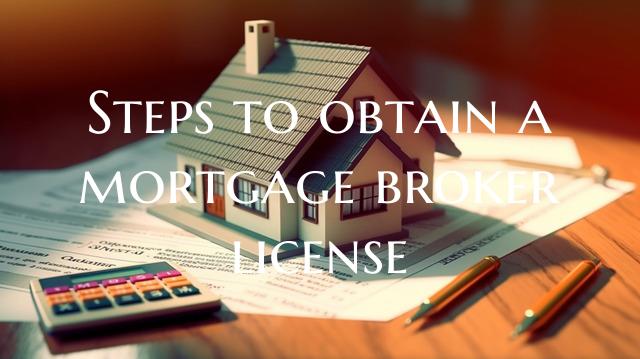Steps to obtain a mortgage broker license

Are you interested in becoming a licensed mortgage broker? Obtaining a mortgage broker license can open up doors to a rewarding career in the financial services industry. This license allows you to act as an intermediary between borrowers seeking mortgage loans and lenders offering mortgage products. Here are the essential steps to help you navigate the process of obtaining a mortgage broker license:
1. Meet the Minimum Requirements: The first step in obtaining a mortgage broker license is to ensure you meet the minimum requirements set by your state licensing authority. These requirements typically include being at least 18 years old, having a high school diploma or equivalent, and passing a background check.
2. Complete Pre-Licensing Education: Most states require aspiring mortgage brokers to complete pre-licensing education courses from an approved provider. These courses cover topics such as federal and state laws and regulations, ethics, mortgage products, and lending practices. Make sure to fulfill the required number of education hours as per your state regulations.
3. Pass the Licensing Exam: After completing the pre-licensing education requirements, you will need to pass the National Mortgage License System (NMLS) exam. This comprehensive exam tests your knowledge of mortgage laws, ethics, lending practices, and other related topics. Be sure to study diligently and prepare for the exam to increase your chances of passing.
4. Submit Your License Application: Once you have successfully completed the pre-licensing education and passed the exam, you can proceed to submit your mortgage broker license application to the appropriate licensing authority in your state. Make sure to provide all the required documentation and pay the applicable fees to initiate the application process.
5. Obtain a Surety Bond: In many states, mortgage brokers are required to obtain a surety bond as part of the licensing process. A surety bond serves as a form of protection for consumers in case the broker engages in fraudulent activities or fails to comply with regulations. Ensure you meet the specific bond amount and requirements set by your state.
6. Maintain Continuing Education: After obtaining your mortgage broker license, you will likely be required to complete continuing education courses to stay informed about industry developments, regulations, and best practices. Stay current with your continuing education requirements to maintain your license in good standing.
By following these steps and adhering to your state's specific licensing requirements, you can achieve your goal of becoming a licensed mortgage broker. Remember to stay informed about industry changes and regulations to provide exceptional service to your clients and build a successful career in the mortgage brokering field.
